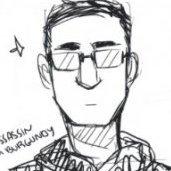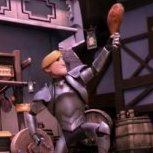-
Posts
1456 -
Joined
-
Last visited
-
Days Won
1
Claincy last won the day on February 24 2014
Claincy had the most liked content!
About Claincy
- Birthday 12/02/1992
Profile Information
-
Member Title
Worldsinger
-
Gender
Male
-
Location
Australia
-
Interests
I'm an independant games developer. I spend a lot of time roleplaying as well as playing a wide variety of other games (video/card/board/miniatures/etc). I am also making/have made a number of <small> games and non-game related projects.
Oh, I also sing and play the trumpet.
Claincy's Achievements
1.8k
Reputation
-
ΨιτιsτηεΒέsτ started following Claincy
-
Claincy changed their profile photo
-
Robin Sedai started following Claincy
-
Happy birthday!
-
I thought I'd leave them on the list for the sake of historical curiosity. But I'm just as happy to remove them if that's mod preference.
- 1349 replies
-
1
-
- update
- reputation
-
(and 1 more)
Tagged with:
-
So you're telling me that's been spelt wrong for 7 years. Oops. Thanks for fixing it.
- 1349 replies
-
- update
- reputation
-
(and 1 more)
Tagged with:
-

Disability in Brandon's Books - [Spoilers All]
Claincy replied to Claincy's topic in General Brandon Discussion
Hey, I’m sorry it’s taken me such a long time to respond. I had another health issue crop up and that ended up making my RSIs worse and it was all a bit of a mess that sapped most of my spare capacity for a while. I’m getting things a bit more under control now and I’ve got some good voice typing software so hopefully this is better late than never. (Sorry for reviving an older topic mods.) Include disabled characters, preferably multiple. There are a lot of disabled people in the real world, probably more than you think. I don’t recall the exact statistic but it’s something like one in five people are disabled. So if you have a cast of a dozen or more characters, having a couple of disabled characters in the mix is actually quite realistic and it makes it much easier to avoid token representation and some negative tropes. They don’t all need to be main characters by any means, though it helps if they’re not *all* extremely minor characters. Avoid bad tropes. Pretty simple, but it is worth noting that many tropes are mostly bad because of being overused/predominant. For example: if the only disabled character in your story is a villain that’s bad. But if you have a number of disabled characters and one of them is a villain (and they aren’t a villain *because of* their disability) that’s fine. Just try to avoid connecting physical abnormality to villainy. We should have disabled villains on occasion, the issue is in linking disability to villainy and in using it as a shorthand for villainy. Following on from that thought; disabled characters should appear in all sorts of different roles and positions, as we do in real life. There are, of a certainty, some occupations/roles/actions that certain disabilities make extremely hard. But just as often the reason a disabled person can’t do something is more down to a lack of accessibility and accommodations (or people just assuming that a disabled person couldn't do it and not giving them the opportunity). A very simple example relevant to the current times: right up through early 2020 many disabled people were refused jobs or positions studying because they would need to work/study from home much of the time and many employers and universities/colleges/schools said that wasn’t possible. I.e. they weren’t willing to bother dealing with it. (There are legal rights about accessibility in many places but they are often ignored. And fighting for them often takes money and energy that many disabled people don't have.) Then the pandemic starts and suddenly these “impossible” accommodations are commonplace because nondisabled people needed them. And you can be certain many of these places will go right back to considering such accommodations impossible as the pandemic wanes. (There’s an extensive rabbit hole here about how disabled people have been ignored, left behind, and otherwise severely impacted by the pandemic (including being refused treatment based on “quality of life”/perceived value and such). But that is a whole other topic and I've already gone on enough of a tangent.) Read about disability representation and the experiences of disabled people. There are a bunch of resources out there that go into a lot more depth than I have about representation. And if you’re writing about a character with a specific disability there are plenty of people who have written about their experiences with that disability. Even as a disabled person I have a lot to learn if I want to write characters with other disabilities well. Get feedback/get disabled people involved. If you’re writing a book, having disabled alpha/beta readers is extremely helpful, as can be disability consultants. For a film or TV show you really want to have disabled people involved in the production and, crucially, to listen to what they have to say. So disabled writers/consultants/actors/etc. I don’t remember the exact numbers but the proportion of characters in American film and TV who are disabled is a fraction of the ~20%+ proportion of people who are disabled in real life. And of the characters who are disabled somewhere in the region of 5% are actually played by disabled actors. Seriously. That number might have improved a little bit now but it’s still ridiculously low. Also “fun” is seeing how many nondisabled actors win awards for playing disabled characters. Just because they won an award for it doesn’t necessarily mean their portrayal was accurate or positive. It means they did a great job of portraying how the critics and a lot of the general audience like to see disabled people in film/tv. Which means even if the performance was good, often the surrounding story and themes were quite problematic. Just doing 1 and 2, including disabled characters and avoiding the negative tropes, is sadly enough to be well above average. But it isn’t hard to do a lot better if you put some effort into doing so. I hope that’s of some use, late as it is.- 36 replies
-
3
-
- disability
- chronic pain
-
(and 1 more)
Tagged with:
-
Bearer of all agonies started following Claincy
-
Happy Birthday!
Have a good one!

-

Disability in Brandon's Books - [Spoilers All]
Claincy replied to Claincy's topic in General Brandon Discussion
@Kingsdaughter613 Sorry for the slow reply. I haven't actually read those comics so I don't have a strong opinion on that specifically. But I suspect if I was reading it now I wouldn't exactly be delighted. Oh right, yeah I forgot about that. With Kel I think it's more emotional trauma + a desire to itch them than outright pain, the physical pain doesn't seem to really have much of an effect/impact. But still. Marsh I definitely should have thought of. Reflecting on it now; we don't get to see much of his perspective (or much of him at all really) after being inquisified until HoA when Ruin's complete control takes centre stage. That's not really a complaint, just noting that we don't really get to see him living with his pain or how it might effect him when not being directly controlled by a much more powerful entity. Spook is more a "has parallels to disability" than "is a disabled character" I think. I don't think hypersensitivity comes up much in media, but it certainly can be a major difficulty. Here it's taken more as a part of a super power, or turned into one. I thought it was worth mentioning the connection, but yeah, I'd hesitate to firmly call him a disabled character. I had completely forgotten about that. That's..hrm. I see *why* and I can see Sazed doing that. But any time you get a setting or situation where you remove all disability, whether through technology or magic, that's...yeah. Not a huge fan. On a more practical consideration, if you have a group of people rebuilding society from the ground up following an apocalypse and none of them are at all disabled that would likely lead to a society even less accessible and more ableist than our own. Not intentionally of course. But if the foundation & default assumption is of a complete lack of disability, I think that's highly unlikely to turn out well for future disabled people.- 36 replies
-
- disability
- chronic pain
-
(and 1 more)
Tagged with:
-

Disability in Brandon's Books - [Spoilers All]
Claincy replied to Claincy's topic in General Brandon Discussion
Exciting update time: I finally gathered the nerve and energy to share the letter on the Brandon subreddit as well. There's a bunch of thoughtful discussion in the thread. And Brandon responded! It's probably best to read the posts with the context of what he was directly replying to, but I'll drop the text here as well for anyone who doesn't want to visit reddit. 1st response 2nd post (I asked him if we would see assistive technology using fabrials, and commented on a poor choice of wording when Hobber is healed that I noticed in my Oathbringer reread.) 3rd post (In response to a post talking about autism and Renarin) In summary, Brandon is great. (Not exactly news, I know.)- 36 replies
-
4
-
- disability
- chronic pain
-
(and 1 more)
Tagged with:
-
No worries, I think koloss control was something I was thinking about on my last reread as well.
-
They can feel the connection, though mostly just when they think about it. It doesn't seem to require any effort to maintain control as Vin maintains control without issue while unconscious and heavily drugged. The exception we see is when the koloss start to frenzy and Elend briefly loses control of them (when the surprise attack with the siege weapons drives them into a frenzy outside Fadrex city). It didn't break the connection, but they did stop following his orders for a short period.
-

Disability in Brandon's Books - [Spoilers All]
Claincy replied to Claincy's topic in General Brandon Discussion
I'm not sure I'm understanding you properly sorry. Are you asking if a mute or nonspeaking person would be able to swear radiant oaths? If so, I'm reasonably sure that they can. It seems that the acceptance of the oath is more important than actually speaking it. Saying the words without embracing the meaning doesn't accomplish anything. Oathbringer: Edgedancer: It is quite possible that to seal the oath properly requires communicating the oath in some way. But if so I expect that could be accomplished through written language, sign language or other means. @Scriptorian That sounds pretty cool to me. So long as the author writing it was taking care to handle the topics seriously/get sensitivity reading. Which it sounds like you are.- 36 replies
-
1
-
- disability
- chronic pain
-
(and 1 more)
Tagged with:













.thumb.jpeg.04df6680efceb0f7e05b6f9eab851f3c.jpeg)
